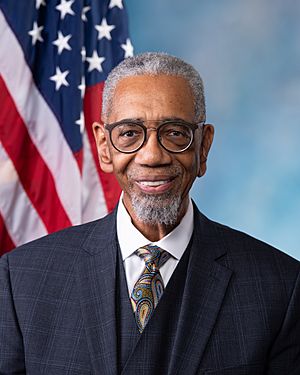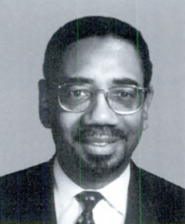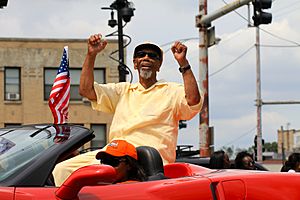Bobby Rush facts for kids
Quick facts for kids
Bobby Rush
|
|
|---|---|
 |
|
| Member of the U.S. House of Representatives from Illinois's 1st district |
|
| In office January 3, 1993 – January 3, 2023 |
|
| Preceded by | Charles Hayes |
| Succeeded by | Jonathan Jackson |
| Member of the Chicago City Council from the 2nd ward |
|
| In office 1983–1993 |
|
| Preceded by | William Barnett |
| Succeeded by | Madeline Haithcock |
| Personal details | |
| Born |
Bobby Lee Rush
November 23, 1946 Albany, Georgia, U.S. |
| Political party | Democratic (1974–present) |
| Other political affiliations |
Black Panther (1968–1974) |
| Spouses |
Sandra Milan
(m. 1965; div. 1973)Carolyn Thomas
(m. 1980; died 2017)Paulette Holloway
(m. 2018) |
| Education | Roosevelt University (BGS) University of Illinois, Chicago (MA) McCormick Theological Seminary (MA) |
| Military service | |
| Allegiance | |
| Branch/service | |
| Years of service | 1963–1968 |
Bobby Lee Rush (born November 23, 1946) is an American politician, activist, and pastor. He served as a U.S. representative for Illinois's 1st district for 30 years, ending in 2023. During the 1960s, Rush was a civil rights activist. He also helped start the Illinois chapter of the Black Panther Party.
Rush was first elected to Congress in 1992. He won many elections in a row until he decided to retire. His district was mainly in the South Side of Chicago. It was known for having a large African-American population. Rush is the only politician who has ever beaten Barack Obama in an election. This happened in the year 2000 during the Democratic primary for his congressional district.
On January 3, 2022, Rush announced that he would retire from Congress.
Contents
Early Life and Activism
Bobby Rush was born on November 23, 1946, in Albany, Georgia. When he was seven, his parents separated. His mother then moved him and his siblings to Chicago, Illinois. This was part of the Great Migration, when many African Americans moved from the South to northern cities.
In 1963, Rush left high school and joined the U.S. Army. While in Chicago in 1966, he joined the Student Nonviolent Coordinating Committee. This group worked to pass important civil rights laws. In 1968, he helped start the Illinois chapter of the Black Panther Party. He later finished his Army service and received an honorable discharge.
Throughout the 1960s, Rush was very active in the civil rights movement. He worked on protests in the southern United States. After co-founding the Illinois Black Panther Party in 1968, he became its defense minister. He also worked on nonviolent projects. These projects helped the Black Panthers gain support in African-American communities. For example, he helped set up a medical clinic that offered sickle-cell anemia testing. In 1974, he left the Black Panthers. Rush later became a deeply religious Christian. He said he didn't regret his time with the Panthers, calling it part of his growth.
Education Journey
Rush continued his education as an adult. He earned his Bachelor's degree with honors from Roosevelt University in 1973. He then got a Master's degree in political science from the University of Illinois at Chicago in 1974. In 1998, he completed a degree in theological studies at McCormick Theological Seminary.
In 2017, Rush received an honorary doctorate from the Illinois Institute of Technology (IIT). This was to recognize his important contributions to Chicago.
Political Career
Starting in Chicago Politics
In 1975, Rush first ran for a seat on the Chicago City Council. He lost that election. But in 1983, he ran again and won. This happened the same year Harold Washington became Chicago's first black mayor. Rush supported Washington during a tough time in the City Council.
After Washington's sudden death in 1987, some of Rush's allies formed a new political party. But Rush chose to work with the Democratic Party instead. This decision helped him become a deputy chairman for the state Democratic Party.
Congressional Elections
In 1992, after new district maps were drawn, Rush ran for Congress in Illinois's 1st district. This district included much of Chicago's South Side. It had been represented by Black congressmen since 1929. Rush won the Democratic primary election, beating the current U.S. Representative Charles Hayes and six other candidates. He then easily won the general election. The 1st district has been held by Democrats since 1935.
In the year 2000, Illinois State Senator Barack Obama challenged Rush in the Democratic primary. Rush argued that Obama wasn't connected enough to Chicago's black neighborhoods. Obama said Rush was part of "a politics that is rooted in the past." Obama did well in his own neighborhood but didn't get enough support from other black neighborhoods. Rush won the primary with 61% of the vote. He then won the general election with 88% of the vote.
Later Chicago Politics
In 1999, Rush ran for mayor of Chicago but lost to the current mayor, Richard M. Daley. He continued to be involved in city politics.
In 2013, Rush disagreed with U.S. Senator Mark Kirk's idea to arrest many members of a Chicago gang. Rush called it an "upper-middle-class, elitist white boy solution." Kirk's spokesman said Kirk had worked on these issues for decades.
Rush has also given his support to different candidates in Chicago mayoral elections. He endorsed Mayor Rahm Emanuel in 2015. In 2019, he supported Bill Daley and then Toni Preckwinkle. In 2023, he endorsed Lori Lightfoot. After she didn't make it to the runoff, he supported Paul Vallas.
Even though he was a close friend of former President Bill Clinton and Hillary Clinton, Rush supported Obama early in the 2008 Democratic presidential primaries. After Obama became president and left his Senate seat, Rush said an African American should be appointed to fill it. He was present when Rod Blagojevich appointed Roland Burris to the seat.
In 2020, Rush endorsed Kamala Harris for president. After she left the race, he supported Michael Bloomberg.
Work in the U.S. House of Representatives
Rush was known as a loyal Democrat during his time in Congress. He was a member of the Congressional Black Caucus.
Key Issues and Laws
- Helping Families with Taxes: Rush started a program in Chicago to help low-income working families get the Earned Income Tax Credit. This is a special tax credit that helps people keep more of their earnings.
- Healthcare: He helped pass the Nursing Relief for Disadvantaged Areas Act in 1999. This law helped bring more nurses to areas that needed them. He also sponsored the Melanie Blocker-Stokes Postpartum Depression Research and Care Act. This bill aimed to help people suffering from postpartum depression. Rush's ideas were also included in the Children's Health Act of 2000, which helped improve asthma management for children.
- Energy: Rush spoke out against a bill that he felt would stop new ideas in energy research. He believed it would hurt efforts to develop new technologies like solar power.
- Gun Safety: In 2009, Rush introduced Blair Holt's Firearm Licensing and Record of Sale Act. This bill would require people who own handguns and certain other firearms to get a federal license. It also said that all sales of these firearms must go through a licensed dealer.
- Human Rights: In 2004, Rush was arrested for protesting the genocide in Darfur outside the Sudanese Embassy. He was one of the first members of Congress to do so.
- Armed Forces: In 2007, Rush disagreed with President George W. Bush's plan to send more troops to Iraq. He believed that the troops' presence was making the situation worse and that a political solution was needed.
- Fighting for Justice: In 2012, Rush wore a hoodie in the House of Representatives to honor Trayvon Martin, a teenager who was shot. He spoke against racial profiling. Because the House rules forbid wearing headgear, Rush was asked to leave the chamber.
- Anti-Lynching Law: Rush worked to make lynching a federal crime. He introduced the Emmett Till Antilynching Act twice. After about 100 years of efforts, this important law finally passed in 2022.
Committee Work
Rush was a member of the United States House Committee on Energy and Commerce. This committee deals with many important topics like communications and energy. He even chaired the Subcommittee on Energy.
Missed Votes
Over his career, Rush missed more votes than many other members of the House. This was mainly due to health issues for him and his wife.
Beloved Community Christian Church
Bobby Rush is the pastor of the Beloved Community Christian Church in Chicago's Englewood neighborhood. The church has programs like a community development group and a public health center.
Personal Life
Rush has been married three times. He has children from his first marriage and with his second wife, Carolyn Thomas, who passed away in 2017. In 2018, he married Paulette Holloway.
In 1999, Rush's son, Huey Rich, was tragically murdered in Chicago. This sad event made Rush even more determined to work on reducing gun violence.
In 2008, Rush had a rare type of tumor removed from his salivary gland. He is a member of the Iota Phi Theta fraternity. DNA analysis suggests he is mainly descended from the Ashanti people of Ghana. Rush has said his heroes include Abraham Lincoln, Kit Carson, and Huey P. Newton.
Images for kids
 | Precious Adams |
 | Lauren Anderson |
 | Janet Collins |




